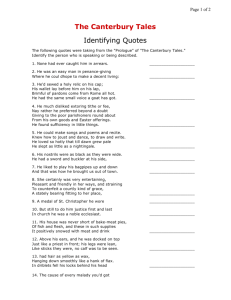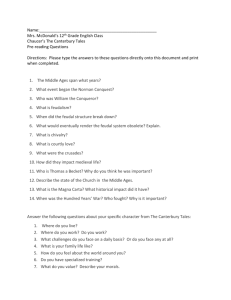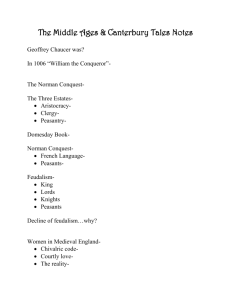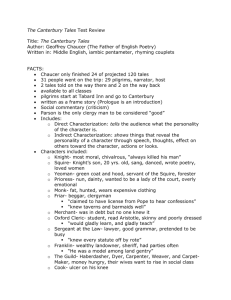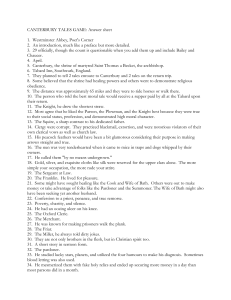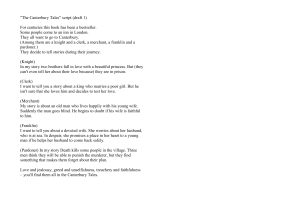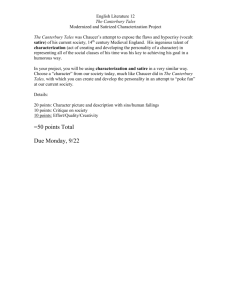from The Canterbury Tales
advertisement
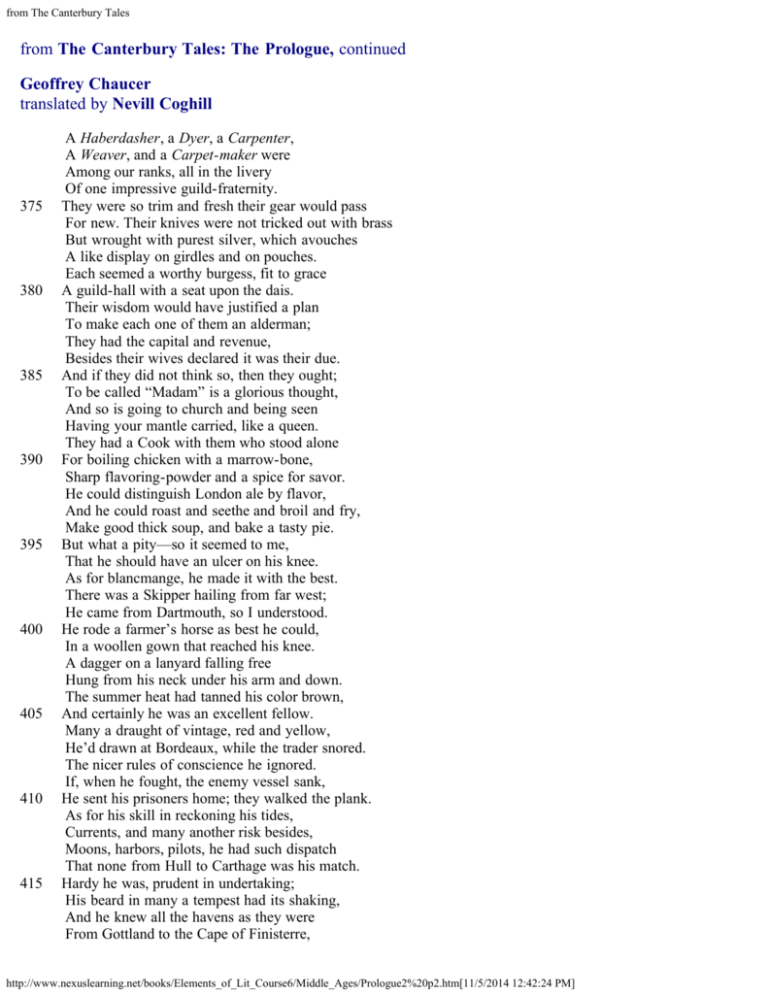
from The Canterbury Tales from The Canterbury Tales: The Prologue, continued Geoffrey Chaucer translated by Nevill Coghill A Haberdasher, a Dyer, a Carpenter, A Weaver, and a Carpet-maker were Among our ranks, all in the livery Of one impressive guild-fraternity. 375 They were so trim and fresh their gear would pass For new. Their knives were not tricked out with brass But wrought with purest silver, which avouches A like display on girdles and on pouches. Each seemed a worthy burgess, fit to grace 380 A guild-hall with a seat upon the dais. Their wisdom would have justified a plan To make each one of them an alderman; They had the capital and revenue, Besides their wives declared it was their due. 385 And if they did not think so, then they ought; To be called “Madam” is a glorious thought, And so is going to church and being seen Having your mantle carried, like a queen. They had a Cook with them who stood alone 390 For boiling chicken with a marrow-bone, Sharp flavoring-powder and a spice for savor. He could distinguish London ale by flavor, And he could roast and seethe and broil and fry, Make good thick soup, and bake a tasty pie. 395 But what a pity—so it seemed to me, That he should have an ulcer on his knee. As for blancmange, he made it with the best. There was a Skipper hailing from far west; He came from Dartmouth, so I understood. 400 He rode a farmer’s horse as best he could, In a woollen gown that reached his knee. A dagger on a lanyard falling free Hung from his neck under his arm and down. The summer heat had tanned his color brown, 405 And certainly he was an excellent fellow. Many a draught of vintage, red and yellow, He’d drawn at Bordeaux, while the trader snored. The nicer rules of conscience he ignored. If, when he fought, the enemy vessel sank, 410 He sent his prisoners home; they walked the plank. As for his skill in reckoning his tides, Currents, and many another risk besides, Moons, harbors, pilots, he had such dispatch That none from Hull to Carthage was his match. 415 Hardy he was, prudent in undertaking; His beard in many a tempest had its shaking, And he knew all the havens as they were From Gottland to the Cape of Finisterre, http://www.nexuslearning.net/books/Elements_of_Lit_Course6/Middle_Ages/Prologue2%20p2.htm[11/5/2014 12:42:24 PM] from The Canterbury Tales And every creek in Brittany and Spain; 420 The barge he owned was called The Maudelayne. A Doctor too emerged as we proceeded; No one alive could talk as well as he did On points of medicine and of surgery, For, being grounded in astronomy, 425 He watched his patient closely for the hours When, by his horoscope, he knew the powers Of favorable planets, then ascendent, Worked on the images for his dependent. The cause of every malady you’d got 430 He knew, and whether dry, cold, moist, or hot; He knew their seat, their humor and condition. He was a perfect practicing physician. These causes being known for what they were, He gave the man his medicine then and there. 435 All his apothecaries in a tribe Were ready with the drugs he would prescribe And each made money from the other’s guile; They had been friendly for a goodish while. He was well-versed in Aesculapius too 440 And what Hippocrates and Rufus knew And Dioscorides, now dead and gone, Galen and Rhazes, Hali, Serapion, Averroes, Avicenna, Constantine, Scotch Bernard, John of Gaddesden, Gilbertine. 445 In his own diet he observed some measure; There were no superfluities for pleasure, Only digestives, nutritives and such. He did not read the Bible very much. In blood-red garments, slashed with bluish gray 450 And lined with taffeta, he rode his way; Yet he was rather close as to expenses And kept the gold he won in pestilences. Gold stimulates the heart, or so we’re told. He therefore had a special love of gold. 455 A worthy woman from beside Bath city Was with us, somewhat deaf, which was a pity. In making cloth she showed so great a bent She bettered those of Ypres and of Ghent. In all the parish not a dame dared stir 460 Towards the altar steps in front of her, And if indeed they did, so wrath was she As to be quite put out of charity. Her kerchiefs were of finely woven ground; I dared have sworn they weighed a good ten pound, 465 The ones she wore on Sunday, on her head. Her hose were of the finest scarlet red And gartered tight; her shoes were soft and new. Bold was her face, handsome, and red in hue. A worthy woman all her life, what’s more 470 She’d had five husbands, all at the church door, Apart from other company in youth; http://www.nexuslearning.net/books/Elements_of_Lit_Course6/Middle_Ages/Prologue2%20p2.htm[11/5/2014 12:42:24 PM] from The Canterbury Tales No need just now to speak of that, forsooth. And she had thrice been to Jerusalem, Seen many strange rivers and passed over them; 475 She’d been to Rome and also to Boulogne, St. James of Compostella and Cologne, And she was skilled in wandering by the way. She had gap-teeth, set widely, truth to say. Easily on an ambling horse she sat 480 Well wimpled up, and on her head a hat As broad as is a buckler or a shield; She had a flowing mantle that concealed Large hips, her heels spurred sharply under that. In company she liked to laugh and chat 485 And knew the remedies for love’s mischances, An art in which she knew the oldest dances. A holy-minded man of good renown There was, and poor, the Parson to a town, Yet he was rich in holy thought and work. 490 He also was a learned man, a clerk, Who truly knew Christ’s gospel and would preach it Devoutly to parishioners, and teach it. Benign and wonderfully diligent, And patient when adversity was sent 495 (For so he proved in much adversity) He hated cursing to extort a fee, Nay rather he preferred beyond a doubt Giving to poor parishioners round about Both from church offerings and his property; 500 He could in little find sufficiency. Wide was his parish, with houses far asunder, Yet he neglected not in rain or thunder, In sickness or in grief, to pay a call On the remotest, whether great or small, 505 Upon his feet, and in his hand a stave. This noble example to his sheep he gave That first he wrought, and afterward he taught; And it was from the Gospel he had caught Those words, and he would add this figure too, 510 That if gold rust, what then will iron do? For if a priest be foul in whom we trust No wonder that a common man should rust; And shame it is to see—let priests take stock— A shitten shepherd and a snowy flock. 515 The true example that a priest should give Is one of cleanness, how the sheep should live. He did not set his benefice to hire And leave his sheep encumbered in the mire Or run to London to earn easy bread 520 By singing masses for the wealthy dead, Or find some Brotherhood and get enrolled. He stayed at home and watched over his fold So that no wolf should make the sheep miscarry. He was a shepherd and no mercenary. 525 Holy and virtuous he was, but then http://www.nexuslearning.net/books/Elements_of_Lit_Course6/Middle_Ages/Prologue2%20p2.htm[11/5/2014 12:42:24 PM] from The Canterbury Tales Never contemptuous of sinful men, Never disdainful, never too proud or fine, But was discreet in teaching and benign. His business was to show a fair behavior 530 And draw men thus to Heaven and their Savior, Unless indeed a man were obstinate; And such, whether of high or low estate, He put to sharp rebuke, to say the least. I think there never was a better priest. 535 He sought no pomp or glory in his dealings, No scrupulosity had spiced his feelings. Christ and His Twelve Apostles and their lore He taught, but followed it himself before. There was a Plowman with him there, his brother; 540 Many a load of dung one time or other He must have carted through the morning dew. He was an honest worker, good and true, Living in peace and perfect charity, And, as the gospel bade him, so did he, 545 Loving God best with all his heart and mind And then his neighbor as himself, repined At no misfortune, slacked for no content, For steadily about his work he went To thrash his corn, to dig or to manure 550 Or make a ditch; and he would help the poor For love of Christ and never take a penny If he could help it, and, as prompt as any, He paid his tithes in full when they were due On what he owned, and on his earnings too. 555 He wore a tabard smock and rode a mare. There was a Reeve, also a Miller, there, A College Manciple from the Inns of Court, A papal Pardoner and, in close consort, A Church-Court Summoner, riding at a trot, 560 And finally myself—that was the lot. The Miller was a chap of sixteen stone, A great stout fellow big in brawn and bone. He did well out of them, for he could go And win the ram at any wrestling show. 565 Broad, knotty, and short-shouldered, he would boast He could heave any door off hinge and post, Or take a run and break it with his head. His beard, like any sow or fox, was red And broad as well, as though it were a spade; 570 And, at its very tip, his nose displayed A wart on which there stood a tuft of hair Red as the bristles in an old sow’s ear. His nostrils were as black as they were wide. He had a sword and buckler at his side, 575 His mighty mouth was like a furnace door. A wrangler and buffoon, he had a store Of tavern stories, filthy in the main. His was a master-hand at stealing grain. http://www.nexuslearning.net/books/Elements_of_Lit_Course6/Middle_Ages/Prologue2%20p2.htm[11/5/2014 12:42:24 PM] from The Canterbury Tales He felt it with his thumb and thus he knew 580 Its quality and took three times his due— A thumb of gold, by God, to gauge an oat! He wore a hood of blue and a white coat. He liked to play his bagpipes up and down And that was how he brought us out of town. 585 The Manciple came from the Inner Temple; All caterers might follow his example In buying victuals; he was never rash Whether he bought on credit or paid cash. He used to watch the market most precisely 590 And got in first, and so he did quite nicely. Now isn’t it a marvel of God’s grace That an illiterate fellow can outpace The wisdom of a heap of learned men? His masters—he had more than thirty then— 595 All versed in the abstrusest legal knowledge, Could have produced a dozen from their College Fit to be stewards in land and rents and game To any Peer in England you could name, And show him how to live on what he had 600 Debt-free (unless of course the Peer were mad) Or be as frugal as he might desire, And make them fit to help about the Shire In any legal case there was to try; And yet this Manciple could wipe their eye. 605 The Reeve was old and choleric and thin; His beard was shaven closely to the skin, His shorn hair came abruptly to a stop Above his ears, and he was docked on top Just like a priest in front; his legs were lean, 610 Like sticks they were, no calf was to be seen. He kept his bins and garners very trim; No auditor could gain a point on him. And he could judge by watching drought and rain The yield he might expect from seed and grain. 615 His master’s sheep, his animals and hens, Pigs, horses, dairies, stores, and cattle-pens Were wholly trusted to his government. He had been under contract to present The accounts, right from his master’s earliest years. 620 No one had ever caught him in arrears. No bailiff, serf, or herdsman dared to kick, He knew their dodges, knew their every trick; Feared like the plague he was, by those beneath. He had a lovely dwelling on a heath, 625 Shadowed in green by trees above the sward. A better hand at bargains than his lord, He had grown rich and had a store of treasure Well tucked away, yet out it came to pleasure His lord with subtle loans or gifts of goods, 630 To earn his thanks and even coats and hoods. When young he’d learnt a useful trade and still He was a carpenter of first-rate skill. http://www.nexuslearning.net/books/Elements_of_Lit_Course6/Middle_Ages/Prologue2%20p2.htm[11/5/2014 12:42:24 PM] from The Canterbury Tales The stallion-cob he rode at a slow trot Was dapple-gray and bore the name of Scot. 635 He wore an overcoat of bluish shade And rather long; he had a rusty blade Slung at his side. He came, as I heard tell, From Norfolk, near a place called Baldeswell. His coat was tucked under his belt and splayed. 640 He rode the hindmost of our cavalcade. There was a Summoner with us at that Inn, His face on fire, like a cherubim, For he had carbuncles. His eyes were narrow, He was as hot and lecherous as a sparrow. 645 Black scabby brows he had, and a thin beard. Children were afraid when he appeared. No quicksilver, lead ointment, tartar creams, No brimstone, no boracic, so it seems, Could make a salve that had the power to bite, 650 Clean up, or cure his whelks of knobby white Or purge the pimples sitting on his cheeks. Garlic he loved, and onions too, and leeks, And drinking strong red wine till all was hazy. Then he would shout and jabber as if crazy, 655 And wouldn’t speak a word except in Latin When he was drunk, such tags as he was pat in; He only had a few, say two or three, That he had mugged up out of some decree; No wonder, for he heard them every day. 660 And, as you know, a man can teach a jay To call out “Walter” better than the Pope. But had you tried to test his wits and grope For more, you’d have found nothing in the bag. Then “Questio quid juris” was his tag. 665 He was a noble varlet and a kind one, You’d meet none better if you went to find one. Why, he’d allow—just for a quart of wine— Any good lad to keep a concubine A twelvemonth and dispense him altogether! 670 And he had finches of his own to feather: And if he found some rascal with a maid He would instruct him not to be afraid In such a case of the Archdeacon’s curse (Unless the rascal’s soul were in his purse) 675 For in his purse the punishment should be. “Purse is the good Archdeacon’s Hell,” said he. But well I know he lied in what he said; A curse should put a guilty man in dread, For curses kill, as shriving brings, salvation. 680 We should beware of excommunication. Thus, as he pleased, the man could bring duress On any young fellow in the diocese. He knew their secrets, they did what he said. He wore a garland set upon his head 685 Large as the holly-bush upon a stake Outside an ale-house, and he had a cake, http://www.nexuslearning.net/books/Elements_of_Lit_Course6/Middle_Ages/Prologue2%20p2.htm[11/5/2014 12:42:24 PM] from The Canterbury Tales A round one, which it was his joke to wield As if it were intended for a shield. He and a gentle Pardoner rode together, 690 A bird from Charing Cross of the same feather, Just back from visiting the Court of Rome. He loudly sang “Come hither, love, come home!” The Summoner sang deep seconds to this song, No trumpet ever sounded half so strong. 695 This Pardoner had hair as yellow as wax, Hanging down smoothly like a hank of flax. In driblets fell his locks behind his head Down to his shoulders which they overspread; Thinly they fell, like rat-tails, one by one. 700 He wore no hood upon his head, for fun; The hood inside his wallet had been stowed, He aimed at riding in the latest mode; But for a little cap his head was bare And he had bulging eye-balls, like a hare. 705 He’d sewed a holy relic on his cap; His wallet lay before him on his lap, Brimful of pardons come from Rome, all hot. He had the same small voice a goat has got. His chin no beard had harbored, nor would harbor, 710 Smoother than ever chin was left by barber. I judge he was a gelding, or a mare. As to his trade, from Berwick down to Ware There was no pardoner of equal grace, For in his trunk he had a pillow-case 715 Which he asserted was Our Lady’s veil. He said he had a gobbet of the sail Saint Peter had the time when he made bold To walk the waves, till Jesu Christ took hold. He had a cross of metal set with stones 720 And, in a glass, a rubble of pigs’ bones. And with these relics, any time he found Some poor up-country parson to astound, In one short day, in money down, he drew More than the parson in a month or two, 725 And by his flatteries and prevarication Made monkeys of the priest and congregation. But still to do him justice first and last In church he was a noble ecclesiast. How well he read a lesson or told a story! 730 But best of all he sang an Offertory, For well he knew that when that song was sung He’d have to preach and tune his honey-tongue And (well he could) win silver from the crowd. That’s why he sang so merrily and loud. 735 Now I have told you shortly, in a clause, The rank, the array, the number, and the cause Of our assembly in this company In Southwark, at that high-class hostelry Known as The Tabard, close beside The Bell. 740 And now the time has come for me to tell http://www.nexuslearning.net/books/Elements_of_Lit_Course6/Middle_Ages/Prologue2%20p2.htm[11/5/2014 12:42:24 PM] from The Canterbury Tales How we behaved that evening; I’ll begin After we had alighted at the Inn, Then I’ll report our journey, stage by stage, All the remainder of our pilgrimage. 745 But first I beg of you, in courtesy, Not to condemn me as unmannerly If I speak plainly and with no concealings And give account of all their words and dealings, Using their very phrases as they fell. 750 For certainly, as you all know so well, He who repeats a tale after a man Is bound to say, as nearly as he can, Each single word, if he remembers it, However rudely spoken or unfit, 755 Or else the tale he tells will be untrue, The things pretended and the phrases new. He may not flinch although it were his brother, He may as well say one word as another. And Christ Himself spoke broad in Holy Writ, 760 Yet there is no scurrility in it, And Plato says, for those with power to read, “The word should be as cousin to the deed.” Further I beg you to forgive it me If I neglect the order and degree 765 And what is due to rank in what I’ve planned. I’m short of wit as you will understand. Our Host gave us great welcome; everyone Was given a place and supper was begun. He served the finest victuals you could think, 770 The wine was strong and we were glad to drink. A very striking man our Host withal, And fit to be a marshal in a hall. His eyes were bright, his girth a little wide; There is no finer burgess in Cheapside. 775 Bold in his speech, yet wise and full of tact, There was no manly attribute he lacked, What’s more he was a merry-hearted man. After our meal he jokingly began To talk of sport, and, among other things 780 After we’d settled up our reckonings, He said as follows: “Truly, gentlemen, You’re very welcome and I can’t think when —Upon my word I’m telling you no lie— I’ve seen a gathering here that looked so spry, 785 No, not this year, as in this tavern now. I’d think you up some fun if I knew how. And, as it happens, a thought has just occurred To please you, costing nothing, on my word. You’re off to Canterbury—well, God speed! 790 Blessed St. Thomas answer to your need! And I don’t doubt, before the journey’s done You mean to while the time in tales and fun. Indeed, there’s little pleasure for your bones Riding along and all as dumb as stones. http://www.nexuslearning.net/books/Elements_of_Lit_Course6/Middle_Ages/Prologue2%20p2.htm[11/5/2014 12:42:24 PM] from The Canterbury Tales 795 So let me then propose for your enjoyment, Just as I said, a suitable employment. And if my notion suits and you agree And promise to submit yourselves to me Playing your parts exactly as I say 800 Tomorrow as you ride along the way, Then by my father’s soul (and he is dead) If you don’t like it you can have my head! Hold up your hands, and not another word.” Well, our opinion was not long deferred, 805 It seemed not worth a serious debate; We all agreed to it at any rate And bade him issue what commands he would. “My lords,” he said, “now listen for your good, And please don’t treat my notion with disdain. 810 This is the point. I’ll make it short and plain. Each one of you shall help to make things slip By telling two stories on the outward trip To Canterbury, that’s what I intend, And, on the homeward way to journey’s end 815 Another two, tales from the days of old; And then the man whose story is best told, That is to say who gives the fullest measure Of good morality and general pleasure, He shall be given a supper, paid by all, 820 Here in this tavern, in this very hall, When we come back again from Canterbury. And in the hope to keep you bright and merry I’ll go along with you myself and ride All at my own expense and serve as guide. 825 I’ll be the judge, and those who won’t obey Shall pay for what we spend upon the way. Now if you all agree to what you’ve heard Tell me at once without another word, And I will make arrangements early for it.” 830 Of course we all agreed, in fact we swore it Delightedly, and made entreaty too That he should act as he proposed to do, Become our Governor in short, and be Judge of our tales and general referee, 835 And set the supper at a certain price. We promised to be ruled by his advice Come high, come low; unanimously thus We set him up in judgment over us. More wine was fetched, the business being done; 840 We drank it off and up went everyone To bed without a moment of delay. Early next morning at the spring of day Up rose our Host and roused us like a cock, Gathering us together in a flock, 845 And off we rode at slightly faster pace Than walking to St. Thomas’ watering-place; And there our Host drew up, began to ease His horse, and said, “Now, listen if you please, http://www.nexuslearning.net/books/Elements_of_Lit_Course6/Middle_Ages/Prologue2%20p2.htm[11/5/2014 12:42:24 PM] from The Canterbury Tales My lords! Remember what you promised me. 850 If evensong and matins will agree Let’s see who shall be first to tell a tale. And as I hope to drink good wine and ale I’ll be your judge. The rebel who disobeys, However much the journey costs, he pays. 855 Now draw for cut and then we can depart; The man who draws the shortest cut shall start.” (The Prologue page 2) http://www.nexuslearning.net/books/Elements_of_Lit_Course6/Middle_Ages/Prologue2%20p2.htm[11/5/2014 12:42:24 PM]
